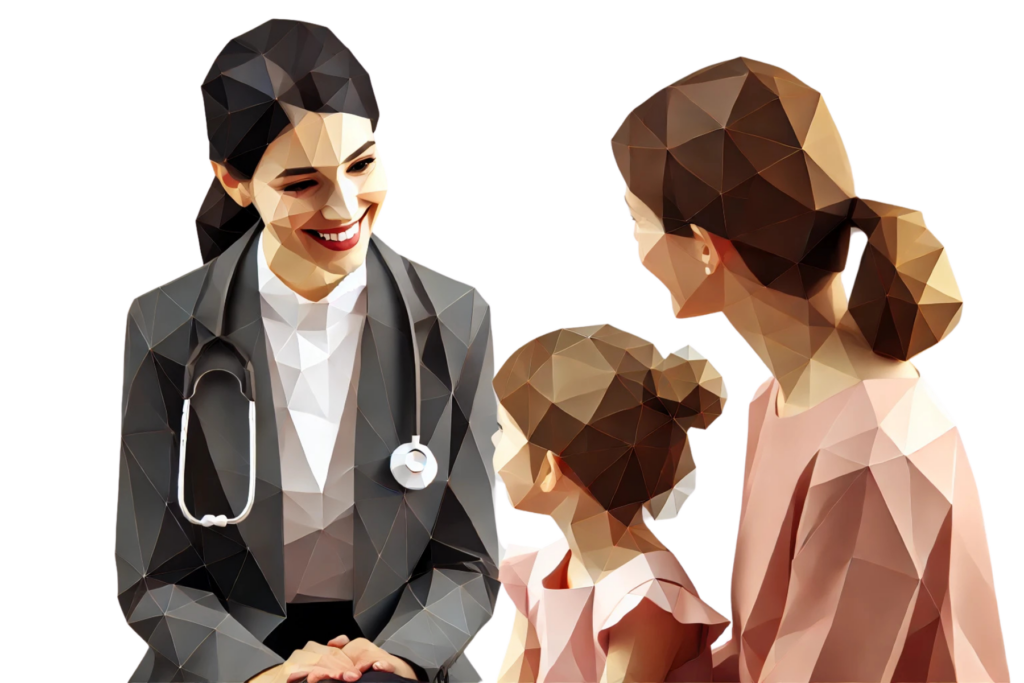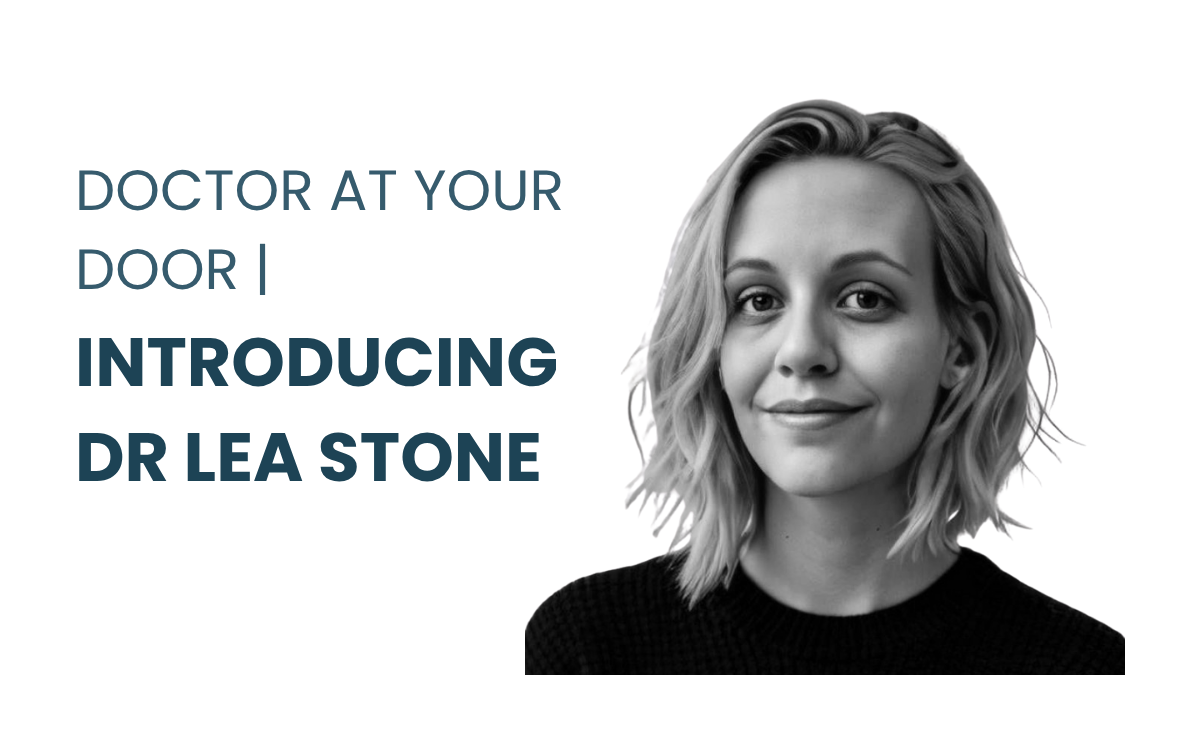Doctorcall’s newest GP is already on the road!
Dr Lea Stone covers home visits along the M40 corridor from Paddington to Amersham, visiting homes across West London, South Buckinghamshire, West Hertfordshire and East Berkshire. She brings a rare mix of surgical precision, clinical intuition and GP-level continuity, shaped by years across hospitals and home settings alike. What stands out, though, is her calm, grounded presence, the kind that makes your own front door feel like the most natural place to begin feeling better.
There’s a small ritual to a home visit with Dr Lea Stone. You may get a quick call before she sets off. “Key safe code? Any pets I should greet?”. Soon after, a Doctorcall-green car pulls up outside. She steps out with her medical bag in hand and an easy, reassuring smile that tells you you’re in good hands.
“Tell me what’s worrying you and we’ll start there,” she may say.
This conversation is a glimpse into the person behind the stethoscope, a doctor who listens with rare care and genuine kindness, whose warmth and gentle humour make you feel instantly at ease.

Lea grew up in Cape Town before the Internet, in a house where entertainment was whatever sat on the bookshelf. Her father began medical school and then switched to dentistry halfway through.
“There were only so many books in the house,” she laughs. “You’d end up reading the back of a shampoo bottle if you had to. I read the medical ones.”
That early proximity didn’t predetermine a career, but it tuned her ear. “Medicine lets you combine science with human connection,” she says. “You meet people at vulnerable moments. Acute illness, anxiety, menopause, childbirth. And you need their backstory to care for them properly.”
As a teenager she moved to the UK when her father took an NHS post. She finished school here and stayed on at Guy’s, King’s and St Thomas’ (GKT), first completing a BSc focused on disease processes and research.
“It taught me to interpret studies with a critical eye”
GKT’s size and mix suited her curiosity: international classmates, students from every corner of the UK, a spread of subspecialty interests.
“It encourages you to think broadly. Common things are common, but you can’t forget the rare. Sometimes a patient just needs someone to find the reason they feel the way they do.”
Finding Purpose in the Burns Unit
In her final year, Lea chased the surgical side of dermatology and landed an elective in plastic surgery in Melbourne. They put her in the burns unit.
“It changed everything,” she says.
Burns medicine, she explains, is far more than flames. Catastrophic skin conditions that undo the body’s barrier; patients from birth to old age; the whole arc from intensive care to slow rehabilitation; psychology and scars that shift with time.
“You might meet someone on the worst day of their life and then see them years later as their life rebuilds.”
Back in London, she secured a rare foundation placement in burns care, an experience that still shapes how she works today. She’s learned to think ahead: treat early, prevent complications, and always ask, what happens if we miss this now?
She gives a simple example, a severe allergic reaction to wedding henna. If it’s treated correctly from the start, the skin heals well. If not, it can blister and scar. “The first steps make all the difference,” she says.
Empathy in Emergency Care
Lea went on to core surgical training and married a neurosurgeon. Two surgical rotas and a young family turned life into logistics. She pivoted to urgent care and the local emergency department, first as a locum and then substantively.
“It taught me to make quick, safe decisions, and also when to slow the room down and really listen.”
Later, pregnant with her second child and newly settled in London, she chose general practice for steadier hours, training in South Buckinghamshire and completing the GP programme in two and a half years. The shift fit her instincts, continuity, context and the quiet power of a timely follow-up.
“A short call two or three days after starting antibiotics can change the whole course.”
Why a GP Home Visit Matters
Lea’s argument for visiting people where they live is simple and practical. A home visit shows more than the symptoms. It shows how someone lives. The steep stairs that make breathing harder, the partner who quietly fills in details, the carer who arrives in the afternoon, the dog that keeps them calm.
“You don’t just see the illness, you see the whole picture,” she says. “That’s how you make a plan that actually works.”
Lea’s first visit to your home has purpose and a rhythm. She calls ahead to introduce herself and sort the logistics. If there’s a long medication list, she asks patients to lay everything out so she can record doses and allergies properly.
She sees people in homes, hotels and offices. History first, then examination and observations.
“We have point-of-care tests for flu, COVID and strep A,” she says.
If the diagnosis is clear, treatment starts right away.
“We carry common items. Basic antibiotics, pain relief, nasal sprays, so often there’s no need to go to a pharmacy.”
Time is generous where needed. Half an hour is typical, complex cases take longer. If a patient needs hospital care, she stays until they’re safely on their way. Afterwards, she schedules a phone follow-up within so the plan can move with the person, not against them.
“Medicine is science, but there’s judgment, too. Two people can sound the same on day one and look very different by day three. You keep checking.”
For Families, Elders and Professionals
Working with children is often easier at home. “A clinic can feel like a place of injections,” she says, smiling.
At home there are toys and familiar rooms. She speaks to the child first. “Want to try my stethoscope?”, and turns fear into a game long enough to do a proper exam.
Then she turns to the parent: what are you most worried about? “It might sound small, but it’s valid. How will I know if I don’t ask?”
Her care for older adults is built on genuine understanding and care. Some 92-year-olds still play tennis; others live with several conditions and many medicines. Every drug brings potential side effects.
“Treat the person, not just the symptoms” If statin cramps are wrecking sleep and pickleball, the plan needs a rethink!
Busy professionals get speed without sloppiness.
“My emergency-department background helps. I can resolve most straightforward issues in about ten minutes,” she says with smile.
During the consultation, her approach stays the same. Direct, calm and focused on what matters most to the patient. “Tell me what’s worrying you, and what do you expect from this consultation” she’ll begin, before examining, testing if needed, and talking through the next steps. If it’s a straightforward case, she explains her reasoning clearly and leaves patients with a plan and a follow-up if required.
Doctor, Mother, Human Being
Lea speaks about pregnancy and the early weeks with a kind of steady empathy that feels lived-in. The voice of someone who’s been through those sleepless nights herself.
“There’s book learning and there’s 3 am learning on the job.”
She also remembers what it feels like to lose your old identity overnight. “When they handed me my daughter, someone said, ‘How are you, Mum?’ and I thought, I’ve been a mother for 20 minutes. I have a name!”
At every six-week check, she asks how the parent is, not just the baby. Her advice is gentle and practical. Support with breastfeeding if it helps, and reassurance that it’s fine to stop if it’s becoming too hard.
“A lot of first-time parents carry guilt. Sometimes they just need someone to say, ‘It’s OK.’”
And if you’re worrying your place is too messy for a doctor? She waves it away.
“I’m a mum of two. Unless your house is on fire, I’ve seen it all. I’m not there to judge your cupboards. I’m there to look after you.”
For older patients who can’t manage the house the way they used to, her only concern is how to bring in support and make it safer.

When Video Consultation Fits, And When It Doesn’t
A home visit is more in-depth and better when the plan is uncertain: she can examine, observe and gather context you can’t get through a screen. But video has its place. “It’s ideal for straightforward issues or when someone at work needs quick advice,” she says. “It depends on the complaint and the person’s preference. We support either route.”
Beyond the Doctor’s Bag
When she isn’t making house calls, Lea is probably somewhere far from home with her family, not for rest, exactly, but for perspective. Travel, she says, has always been her favourite kind of education. “I love learning about people and their histories,” she says. “What better way to understand than to experience it yourself?”
She remembers one trip especially well. After visiting Thailand, Cambodia and Vietnam, she decided on a whim to keep going, to Myanmar, still quiet and little-visited at the time. “It was one of those impulsive decisions,” she says. “I thought, why not stay a few weeks?” Those few weeks turned into six. She travelled with her aunt, kindred spirit and a long time travel companion, wandering through temples, markets and small villages where life moved at a slower, more peaceful pace.
“It was raw and beautiful,” she says. “The kind of trip that changes how you see people, and how you see yourself.”
A Midlife Reminder, And a Small Tablet of Sun
Asked for an everyday health tip, she skips the usual clichés and goes straight to what she sees most often.
“If you’re a woman in your forties or early fifties and things feel off, don’t just put it down to tiredness,” she says.
“It could be pre- or perimenopause. There’s real help available, including HRT when appropriate, and it can make a remarkable difference.”
Then she adds one more with a smile: “And if you live in the UK, take vitamin D. We all need it!”
With Dr Lea Stone part of the Doctorcall team, GP home visits feel both reassuringly traditional and perfectly suited to modern life. She covers patients along the M40 corridor from Paddington to Amersham, visiting homes across West London, South Buckinghamshire, West Hertfordshire and East Berkshire.
Her way of working captures what Doctorcall stands for, thoughtful, attentive medicine delivered wherever patients feel most comfortable. Whether it’s a family with young children, an older patient needing continuity, or a professional fitting care into a busy schedule, she brings a calm presence, clear communication and genuine warmth to every visit.
Dr Stone now looks after a dedicated list of patients as a Concierge GP. Members can also message her directly on WhatsApp during office hours.
Places on her personal list are limited.
